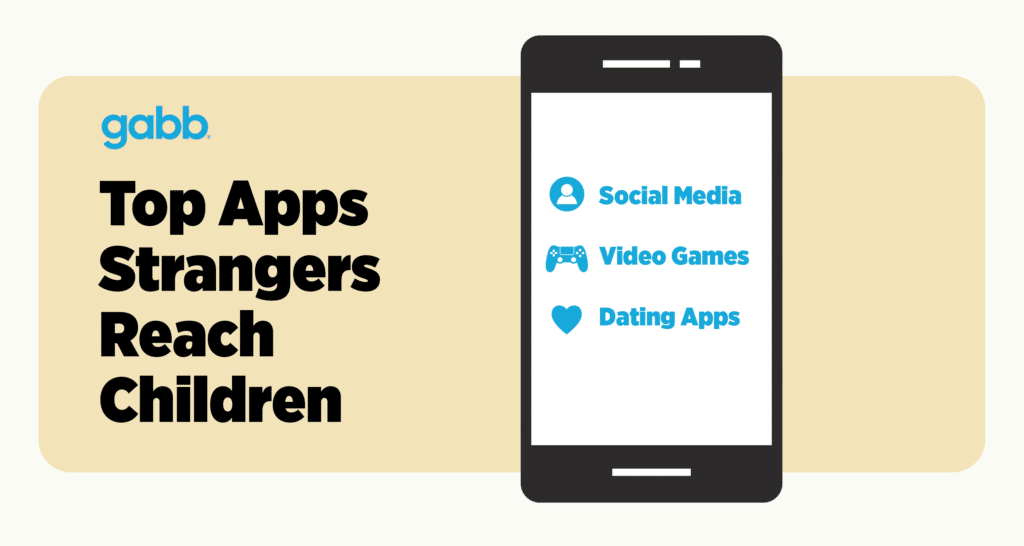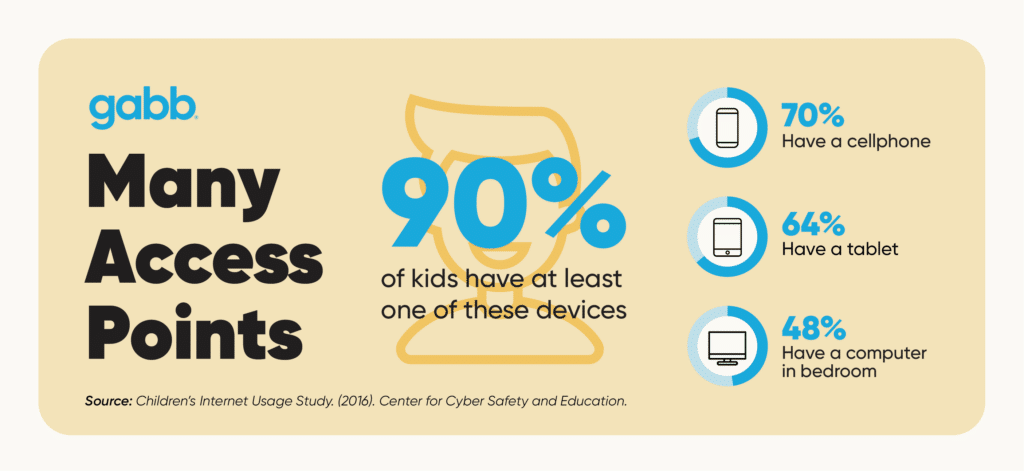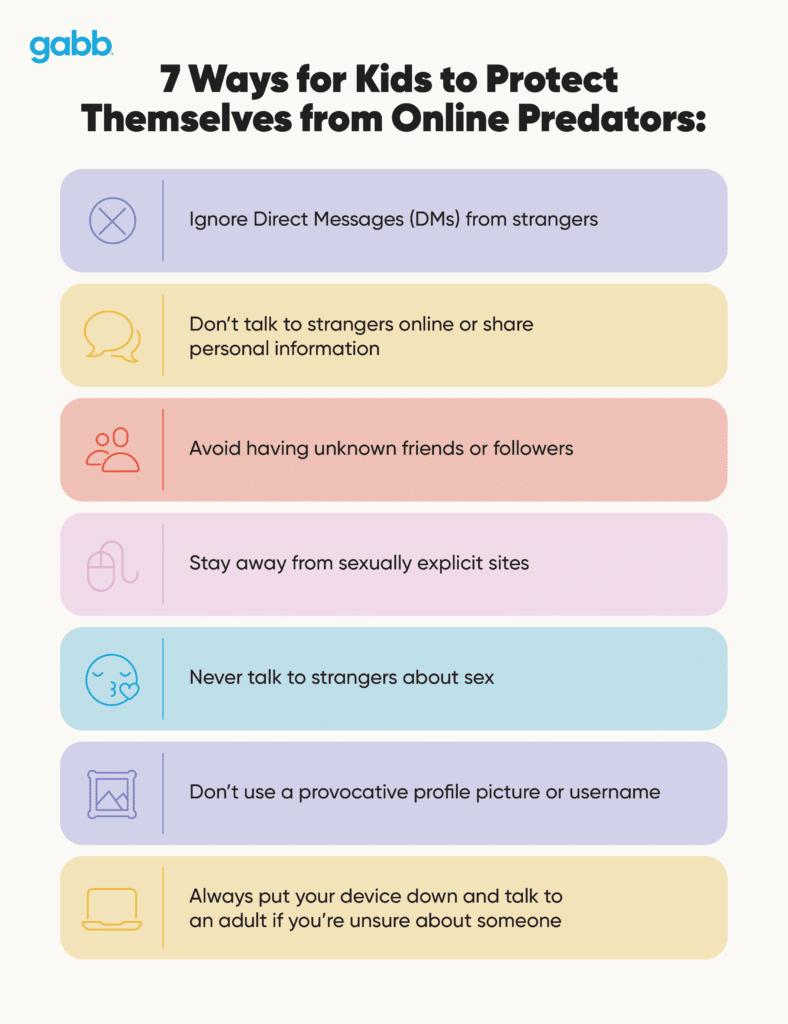“Stranger danger” usually conjures images of shady men at playgrounds luring kids into their vans with candy or puppies.
We teach our kids not to talk to strangers in real life, but what about online? When a child is using apps or a web browser, strangers may have access to them.
Offline vs. online stranger danger
Technology has opened new and easier ways for predators to reach our children. [1] While any time a child has been harmed is unacceptable, recognizing that a child is more likely to be exploited by a stranger online will help protect our children.
Movies and media reports highlight the rare and tragic times a child goes into a car with a stranger, although missing children—including child abductions—are down 40% since 1997. [2]
Research shows kids are drastically more likely to be approached by a predator online than kidnapped on the street.
—National Center for Missing & Exploited Children
The National Center for Missing and Exploited Children (NCMEC) reported 600 cases of non-family child abduction attempts in 2020, with kidnappers using animals, candy, money, offers of rides, etc. to lure the victims. [3]
While street abductions have dropped, cyber predation has skyrocketed.
The National Center for Missing and Exploited Children received 21.7 million reports of online child sexual exploitation in 2020—the highest ever recorded by the NCMEC since its inception 36 years prior. [4] This was a 97.5% increase in reports from the previous year. [4]
In 98% of these cases, the cyber predator was a stranger to the child. [4]
While not all strangers online are dangerous, the FBI estimates 500,000 predators are online every day looking for victims. [5]
Many predators will be in contact with several children at one time using different aliases.
According to detective Richard Wistocki in the documentary Childhood 2.0, “The average internet predator has 250 victims in their lifetime.” [6]
Parents can be aware of common places predators reach children online.

Where Can Strangers Talk to Children Online?
Strangers with criminal intent target children almost anywhere online, mainly on social media, video games, and teen dating sites.

Predators are experts at gaining the trust of vulnerable children before desensitizing and controlling them.
They lure children with psychological tactics (called grooming) such as compliments, offering support, showing interest in similar hobbies, and offering gifts, money, or toys. [7] Kids can learn to watch for these warning signs and tell their parents or another trusted adult if they experience them.
Sometimes predators gain trust by catfishing – taking on the persona of a fake person that relates to or is close in age to the victim.
Parents can learn how predators blackmail kids and watch for the signs of grooming.
Social Media
82% of child sex crimes begin with the predator communicating with the victim on social media websites. [8] This contact can begin on a public forum and then move to a private channel.
Virtually all social media sites allow for private conversations with strangers, called direct messages or “DMs.”
Popular apps including TikTok, Snapchat, Open, NGL, BeReal, Instagram, Twitch, and Discord all have the risk of stranger interactions.
As parents, we can delay social media by providing our kids with a basic phone, setting up available parental controls on smart devices, setting any social media accounts to private, and teaching our children only to add trusted friends they know in real life.
Video Games
Many parents may not be aware that predators play video games to find victims.
Strangers can communicate with children playing online games such as Roblox and Among Us, or through virtual reality games with an Oculus.
As parents, we can consider making video games safer by using parental controls to turn off public chat, playing private games only with people we know, monitoring children’s online activities, and talking often with children about online stranger danger.

Teen Dating Apps
Teens are using several apps as dating and hookup sites, and predators are taking advantage. Many of these apps are geared towards teens, but age verifications lack authentication and anyone can lie about their age, both children and predators.
Yubo
Yubo is a social networking site with a dating format similar to Tinder (swipe to match) with 99% of users ages 13-25. [9]
The normalization of opening your world to a stranger online is at the center of Yubo. Yubo “instantly connects you with people all over the world” through games, chat and live streaming (live video). [10]
Yubo asks you to list your hobbies and interests to connect with others like you. However, finding common interests to gain trust is a key tactic of groomers.
Despite Yubo’s parental controls, there are concerns Yubo will open children to be groomed by adult predators.
MyLOL
MyLOL touts itself as the number one teen dating site in the USA and has over 1 million teens on its platform.
It boasts a teen chat room where teens can exchange photos, and encourages you to meet new people in your area or around the world. [11]
MyLOL was taken off of the apple app store after it was discovered it allowed children under 13, and the Google app store followed suit. Teens can still access it by making a profile on the website and if the app was downloaded prior to it being taken off the app store, it will be fully functional.
Skout
Skout may be an 18+ app, but without an age verification in place, it is a top dating app for teens. Skout has a live stream function, which is inherently risky since video content in real-time is harder to filter.
Tragically, Skout has been linked to numerous underage rapes. In 2012 three men, some with prior criminal charges, contacted kids on the app and sexually assaulted a 13 and 17-year-old girl and a 13-year-old boy. [12]
Skout shut down their forum to children under the age of 17, however, the app lacks a verification system that could prevent kids from lying about their age.
MeetMe
MeetMe is another app made for adults that teens join by forgoing their optional age verification process.
A central feature of the app, MeetMe Live, allows users to live stream a video of themselves to everyone on the app. There are various streamer rankings, with rewards such as special animations or backgrounds for those at the top tiers. [13]
While MeetMe claims to not allow convicted sex offenders, one sexual predator evaded detection simply by using a fake last name and rose to be one of their most popular VIP streamers.
If your teen is using one of these apps, especially those designated for adults, encourage them to delete their account. Talk to your children about the importance of forging in-person connections, the dangers of online dating apps, the risks of meeting strangers for dates, and online dating violence.

How Can Children Be Sexually Abused Online
While online predators sometimes entice children to meet in person, a child can be sexually abused virtually without ever meeting their offender in real life. This is called online child exploitation or online sexual abuse.
Online child sexual exploitation refers to the usage of the internet or communication technologies as a method to facilitate the sexual abuse of children and adolescents. This can take place directly online or through a combination of offline and online interactions.
—In Hope, 2021 [14]
Cyber predators have goals for luring children, including getting sexually explicit images of children (60%), sex (32%), to engage in virtual sexual role playing/conversation (8%), or for financial gain (2%). [15]
Online predators can use images they coerce kids to share to further sexually extort them, called sextortion.
Examples of Online Sexual Abuse:
- Sending a child explicit comments
- Pressuring an adolescent into sexual conversations or role-playing
- Sharing nude images or explicit videos to a child
- Coercing a child to send nude images or videos
- Performing sexual acts on a webcam with a minor
Effects of online child sexual exploitation
Abuse behind a screen can impact a child as much as offline abuse. Survivors of online abuse experience at least the same level of psychological distress as offline sexual abuse victims. [16]
Moreover, children can feel revictimized if sexual images or videos of themselves are shared online.
Survivors can find support and healing by telling a trusted adult and accessing resources 24/7 such as RAINN’s crisis support services.

How Parents Can Help
As parents, we want to protect our kids. We may not have realized that handing our children a phone, tablet, or video game controller can expose them to dangerous people online. When we know better, we do better.
With the amount of online exposure our children have, it is vital that we actively work to prevent predators from reaching our children.
We can be involved, set family rules and reduce access points, and teach children what to do if a stranger reaches out to them.
Be Involved
As parents, we can be involved in our child’s online life. We can talk to them often about what they are doing online, who they are talking to if they have any fake social media accounts, and what trends they have heard about.
Often, parents are not aware their children are talking to strangers online.
Among 4-8th graders, 40% of children had talked to a stranger online at least once, 53% gave out their phone number, 6% revealed their home address and 15% tried to meet a stranger. [17]
Our kids want us to be involved. Even though parents perceive they communicate enough with their teenagers about important topics, teens report a need for more communication.
93% of parents report they talk to their teenagers “occasionally or often” about appropriate online behavior while adolescents said that 60% of parents “rarely or never” discussed it. [18]
This discrepancy highlights the need for more ongoing, open conversations between parents and children. If parents are unsure what to talk about, cyberbullying, drugs on social media, online dating violence, and sexting are great places to start.
What if my teen won’t talk to me?
Teens may be more hesitant to turn to parents about online issues than parents would like to believe. As trusted adults, we can prepare for a child’s disclosure about problems they are experiencing. Kids will know they are not alone when handling inappropriate environments online by knowing that we are a safe place to go when they are in danger.
Although young people may not always reach out voluntarily to their parents, we can regularly ask about our children’s online lives.
We can increase the chances of kids confiding in their struggles with us by promising not to get angry or punish them for what they may disclose.
If they still don’t open up to us, we can encourage them to go to another trusted adult such as another family member, teacher, school counselor, or police officer for help.
Set Family Rules
We can manage family technology rules, such as turning off all public chats on video games, keeping devices out of bedrooms, and keeping teens off dangerous social media sites.
Family rules are effective, with 74% of kids reporting that they follow their family rules regarding online safety. [19]
Parents can explain the reasons behind these decisions in age-appropriate ways. This increases their likelihood of following the rule [20], and helps children learn to judge situations for themselves as they grow.
Reduce Access Points
Predators have many access points for children online today. 70% of children have a cell phone, 64% have a tablet, and 48% have a computer in their bedroom. 90% of children have at least one of these. [21]
The fewer places predators can reach our children, the lower the risk.
Keeping all technology in public areas of the home, setting up parental controls and internet filters, and monitoring our children’s online activities are all protective factors against grooming.

We also know that while our best efforts reduce the risk, it is still important to teach our children what to do if a stranger contacts them.
Teach Kids
Parents can teach kids about strangers online. Teach them not to share any images or videos with strangers and to not tell strangers their school name, phone number, and house address.
Kids can be encouraged to be wary of strangers and trust their instincts if they feel unsafe or are in a dangerous situation.
Into the Cloud offers engaging children digital safety video series for elementary through high school kids.
Children can be taught online grooming awareness to spot when a contact online may be a predator trying to groom them.

Parents can learn more ways to help their children stay safe online by checking out our other articles on Gabb’s blog.
Works Cited:
[1] Finkelhor, D., Turner, H., & Colburn, D. (2022). Prevalence of Online Sexual Offenses Against Children in the US. JAMA Network Open, 5(10), e2234471. https://doi.org/10.1001/jamanetworkopen.2022.34471
[2] Ingraham, C. (2015, April 14). There’s never been a safer time to be a kid in America. Washington Post. https://www.washingtonpost.com/news/wonk/wp/2015/04/14/theres-never-been-a-safer-time-to-be-a-kid-in-america/
[3] Non-family Abductions & Attempts. (n.d.). National Center for Missing & Exploited Children. https://www.missingkids.org/theissues/nonfamily#bythenumbers
[4] Rise in Online Enticement and Other Trends: NCMEC Releases 2020 Exploitation Stats. (n.d.). National Center for Missing & Exploited Children. https://www.missingkids.org/blog/2021/rise-in-online-enticement-and-other-trends–ncmec-releases-2020-
[5] Online Predators & Human Trafficking Awareness. (n.d.). Mobile County District Attorney. https://www.mobileda.org/humantrafficking/
[6] Childhood 2.0 movie. Childhood 2.0 is an essential documentary that explores the unique challenges facing kids growing up in the digital age. Watch now to learn from industry-leading experts about everything from cyberbullying to online predators. (n.d.). Retrieved February 27, 2023, from https://www.childhood2movie.com/
[7] Winters, G. M., Jeglic, E. L., & Kaylor, L. E. (2020). Validation of the sexual grooming model of child sexual abusers. Journal of Child Sexual Abuse: Research, Treatment, & Program Innovations for Victims, Survivors, & Offenders, 29(7), 855–875
[8] Muntingh, L. (2023, February 20). Online Predators Statistics and FAQs. Screen and Reveal. https://screenandreveal.com/online-predators-statistics/#:~:text=Research%20has%20found%20that%2082,with%20their%20likes%20and%20dislikes.
[9] Team, I. M. (2022, December 21). What is Yubo? – What parents need to know | Internet Matters. Internet Matters. https://www.internetmatters.org/hub/news-blogs/yubo-formerly-yellow-social-media-app-parents-need-know/
[10] Yubo – Get friends * Get real * Go live. (2023, February 3). Yubo. https://www.yubo.live/
[11] Come and check out MyLOL.com! (n.d.). https://www.mylol.com. https://www.mylol.com/
[12] Maltais, M. (2019, March 15). Skout app may shut teen forum permanently over safety concerns – Los Angeles Times. Los Angeles Times. https://www.latimes.com/business/la-xpm-2012-jun-20-la-fi-skout-20120621-story.html
[13] Hallanan, L. (2018, September 27). Kickstarting Your Journey to Becoming a Top Streamer. Medium. https://medium.com/themeetgroup/kickstarting-your-journey-to-becoming-a-top-streamer-f0e8bed46552
[14] INHOPE | What is online child sexual exploitation? (n.d.). https://www.inhope.org/EN/articles/what-is-online-child-sexual-exploitation
[15] The Online Enticement of Children: An In-Depth Analysis of CyberTipline Reports. (2017). In The National Center for Missing & Exploited Children. Retrieved February 23, 2023, from https://www.missingkids.org/content/dam/missingkids/pdfs/ncmec-analysis/Online%20Enticement%20Pre-Travel.pdf
[16] Jonsson, L.S., Fredlund, C., Priebe, G. et al. Online sexual abuse of adolescents by a perpetrator met online: a cross-sectional study. Child Adolesc Psychiatry Ment Health 13, 32 (2019). https://doi.org/10.1186/s13034-019-0292-1
[17] Children’s Internet Usage Study. (2016). Center for Cyber Safety and Education. Retrieved February 17, 2023, from https://isc2-center.my.salesforce.com/sfc/p/#G0000000iVSt/a/0f000000fyoc/TYQ9XvDATBA78rR00G.PGJ9fmaLm1vQfAW9HCpy3GWk
[18] 0% of Teens Rarely or Never Talk to Their Parents About Appropriate Online Behavior, Survey Finds. (2019, November 7). Business Wire. Retrieved February 17, 2023, from https://www.businesswire.com/news/home/20191107005347/en/60-of-Teens-Rarely-or-Never-Talk-to-Their-Parents-About-Appropriate-Online-Behavior-Survey-Finds
[19] Ibrahim, E. (2010, July 6). Norton Online Family Report 2010. Retrieved February 17, 2023, from https://edublog.net/wp/wp-content/uploads/2010/07/norton_online_family_report_presentation_sg.pdf
[20] Jarocha, T. (2022, February 8). How to Give Kids Effective Instructions. Child Mind Institute. https://childmind.org/article/how-to-give-kids-effective-instructions/
[21] Children’s Internet Usage Study. (2016). Center for Cyber Safety and Education. Retrieved February 17, 2023, from https://isc2-center.my.salesforce.com/sfc/p/#G0000000iVSt/a/0f000000fyoc/TYQ9XvDATBA78rR00G.PGJ9fmaLm1vQfAW9HCpy3GWk









Success!
Your comment has been submitted for review! We will notify you when it has been approved and posted!
Thank you!